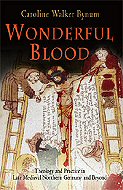|
Wonderful Blood: Theology and Practice in Late Medieval Northern Germany and Beyond
|
|
Caroline Walker Bynum
|

|

Wilsnack, a quiet market town in north-eastern Germany, is unfamiliar to most English-speakers and even to many modern Germans. Yet in the fifteenth century it was a European pilgrimage site surpassed in importance only by Rome and Santiago de Compostela. The goal of pilgrimage was three miraculous hosts, supposedly discovered in the charred remains of the village church several days after it had been torched by a marauding knight in August 1383. Although the church had been burned and the spot soaked with rain, the hosts were found intact and dry, with a drop of Christ's blood at the center of each.
In Wonderful Blood, Caroline Walker Bynum studies the saving power attributed to Christ's blood at north German cult sites such as Wilsnack, the theological controversy such sites generated, and the hundreds of devotional paintings, poems, and prayers dedicated to Christ's wounds, scourging, and bloody crucifixion. She argues that Christ's blood as both object and symbol was central to late medieval art, literature, pious practice, and theology. As object of veneration, blood provided a focus of intense debate about the nature of matter, body, and God and an occasion for Jewish persecution; as motif, blood became a prominent subject of northern art and a central symbol in the visions of mystics and the prayers of ordinary people.[...]
Caroline Walker Bynum is Professor of Medieval History at the Institute for Advanced Study in Princeton, New Jersey. A past president of both the American Historical Association and the Medieval Academy of America, she was a MacArthur Fellow from 1986 to 1991. She is the author of several books, including Metamorphosis and Identity, The Resurrection of the Body in Western Christianity, 200-1336, Fragmentation and Redemption: Essays on Gender and the Human Body in Medieval Religion, Holy Feast and Holy Fast: The Religious Significance of Food to Medieval Women, and Jesus as Mother: Studies in the Spirituality of the High Middle Ages.[…]
|
|
